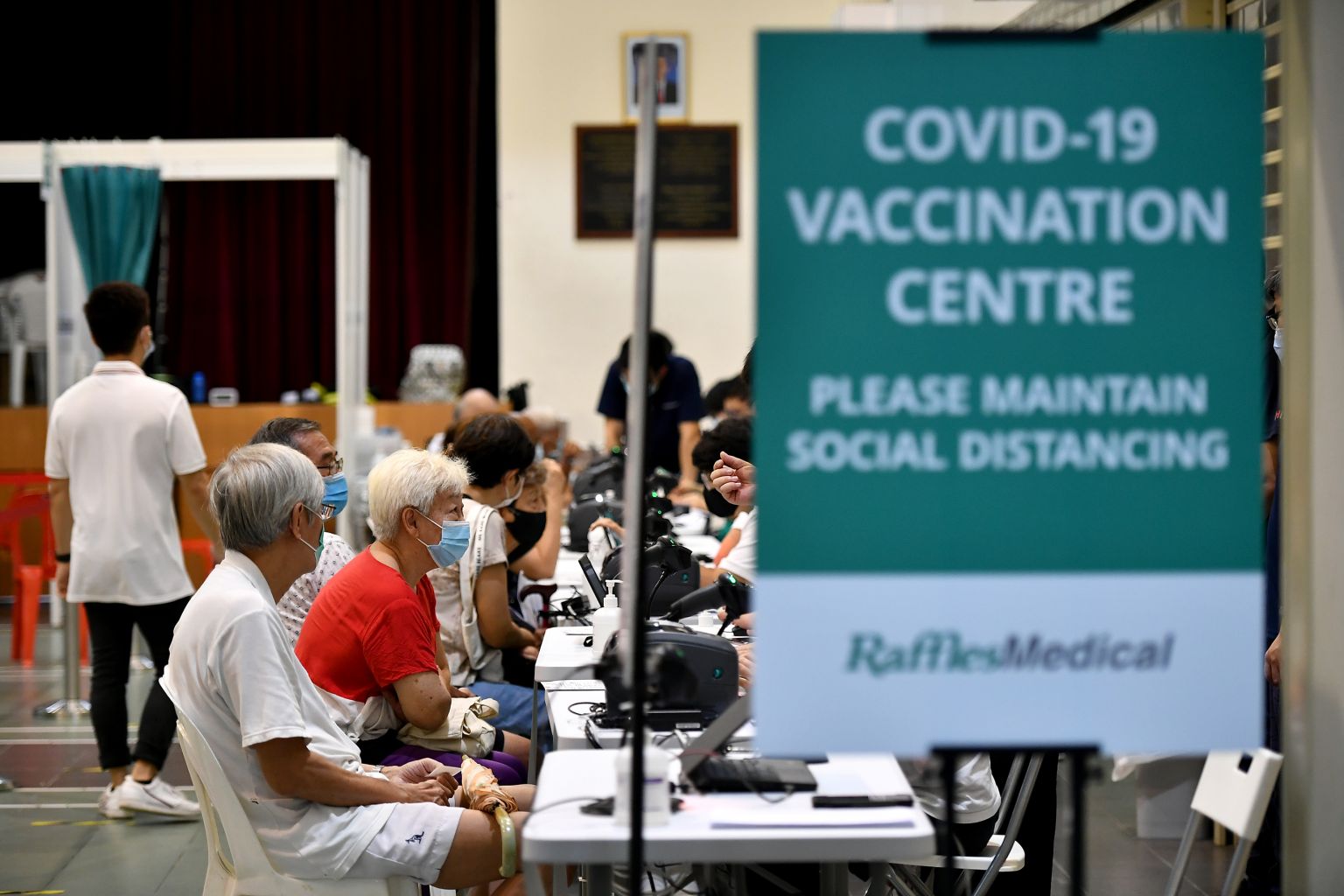Commentary
Vaccinating seniors against Covid-19 will pave the way to a new normal in Singapore
Sign up now: Get ST's newsletters delivered to your inbox

A March 2021 photo shows people at the Covid-19 vaccination centre in Hong Kah North Community Club.
ST PHOTO: LIM YAOHUI
Follow topic:
SINGAPORE - "Instead of greeting an elderly person with 'Jiak ba buay', which means 'have you eaten' in Hokkien, ask them 'vax liao buay?', which means 'have you taken the vaccines?'" suggested my colleague.
Whichever method or language you use, the point is to persuade others, particularly seniors who are at risk of becoming critically ill when infected, to get the Covid-19 vaccines.
As the virus is now spreading among markets and food centres, infecting more seniors than expected, Singapore is going back to phase two (heightened alert) and determined to get more seniors vaccinated.
It is to prevent a pandemic of the unvaccinated, a term used by the director of the United States Centres for Disease Control and Prevention to warn of the situation there, as Covid-19 cases are once again filling hospitals in places where the majority have yet to be vaccinated.
This is happening as the highly contagious Delta variant takes hold there, even as US President Joe Biden is urging Americans to get vaccinated.
In the region, the Delta variant is being detected in more and more places, as it rips through various parts of South-east Asia, including Thailand, Malaysia and Vietnam.
Indonesia, in particular, has become the new epicentre of the pandemic, with reports of people scrambling to find oxygen supplies for loved ones infected with Covid-19. Only around 6 per cent of its population have been vaccinated.
The authorities in Singapore believe that the Delta variant responsible for the Jurong Fishery Port Covid-19 cluster - now the biggest active one with 321 cases as at Tuesday (July 20) - was likely from Indonesian or other fishing boats that brought fish into the port.
But curbing further spread of the disease is not about closing off the country and locking ourselves in to keep out the virus, but about getting the eligible ones - particularly the elderly - vaccinated.
Vaccination protects seniors from becoming critically ill with Covid-19 when infected.
Vaccination of the elderly population protects us (hopefully) from more restrictions ahead and will enable Singapore to move forward with its reopening plans.
The plan here is to live with an endemic Covid-19 and to ease restrictions once two-thirds of the people here are fully vaccinated and largely protected from falling very ill with the disease.
The authorities have said that the crux is no longer the number of new cases that emerges each day, but the number of unvaccinated seniors who are infected.
Vaccination is now their - and the nation's - best weapon against the Covid-19 virus, which seems to have gone into stealth mode.
A vaccination certificate does not give people the passport to do whatever they like or the excuse to forget their mask, as vaccinated people can spread the disease to the unvaccinated.
As the return to phase two (heightened alert) shows, vaccinated people are not free till the size of the unvaccinated group is reduced significantly.
Thankfully, the end appears to be in sight.
"When we reach a much more resilient stage, with a much higher percentage of our population fully vaccinated, we can then reopen the industries, with the confidence that even if cases were to reach 100 to 200 cases like today, or even higher, we know we can stay safe and businesses can continue and lives can go on," said Mr Ong at the press conference by the multi-ministry task force on Covid-19 on Tuesday.
Nevertheless, even as we hope that phase two (heightened alert) is the last lap, we have to remain flexible because the situation is dynamic.
As long as the virus is not tamed elsewhere, our reopening will be impacted.
As long as the virus continues to mutate, there will be the risk of a new variant overpowering the vaccines' effectiveness. Booster jabs may then be needed.
Another pandemic could also emerge in the future, perhaps sooner than expected.
We will have to adapt and adjust, and this could well be the new normal.

